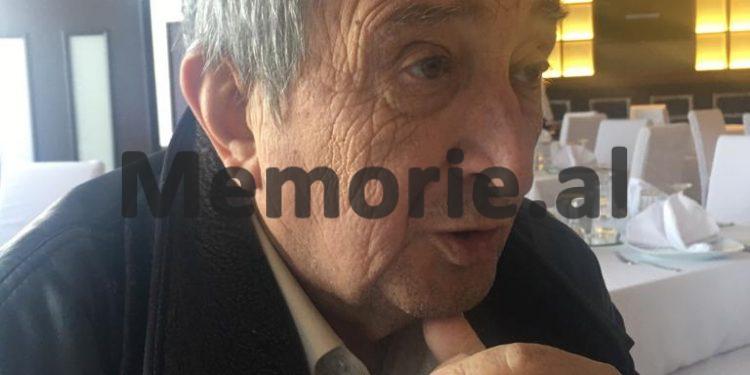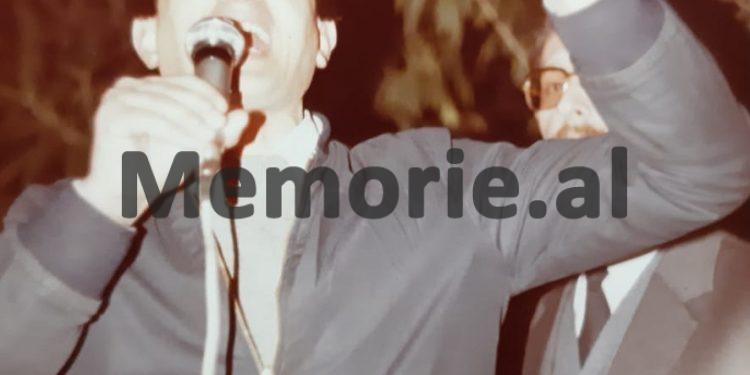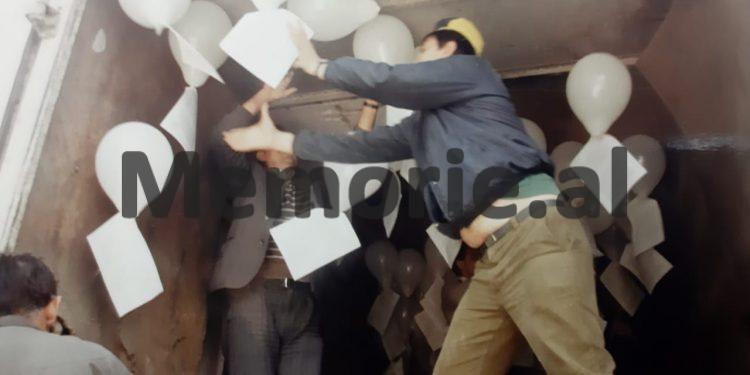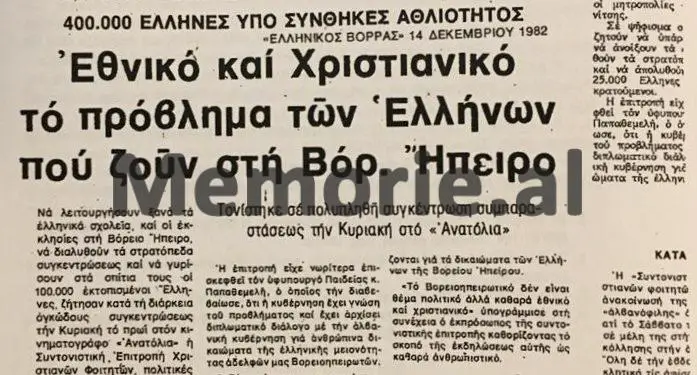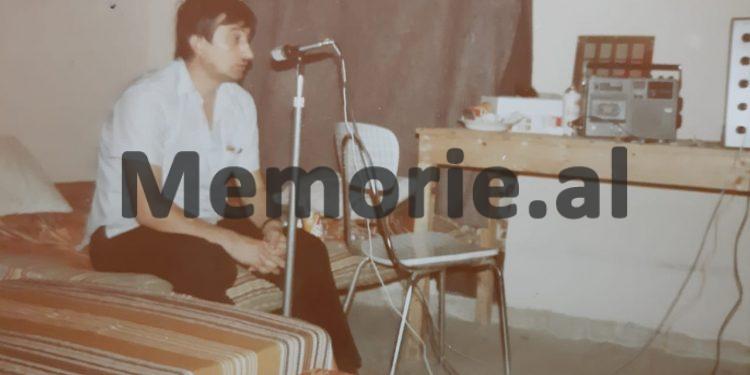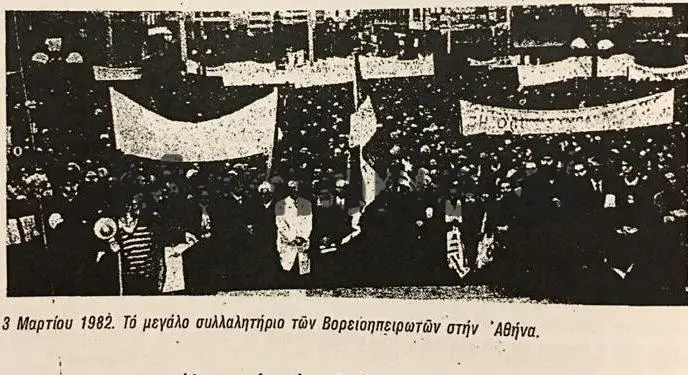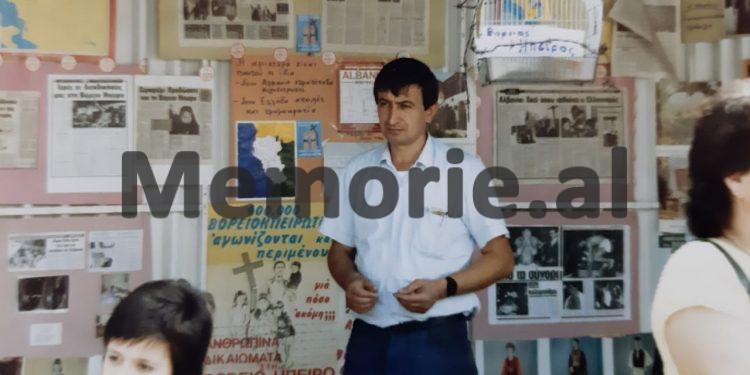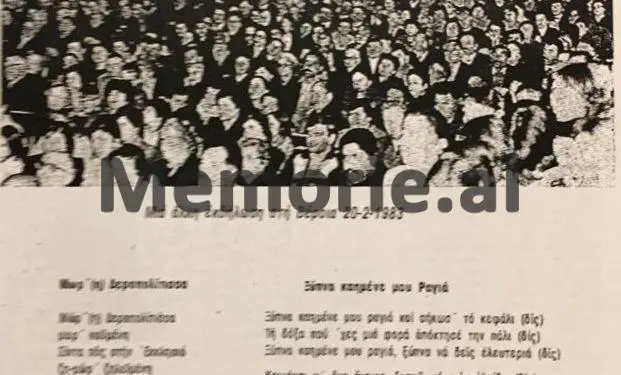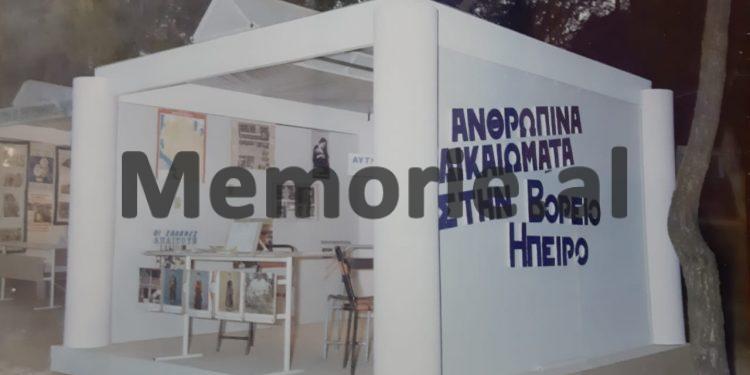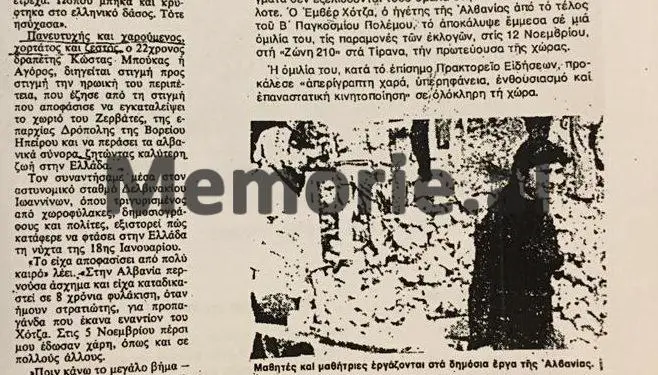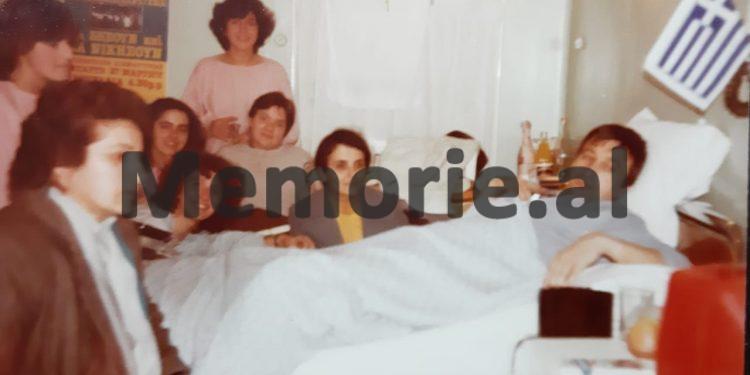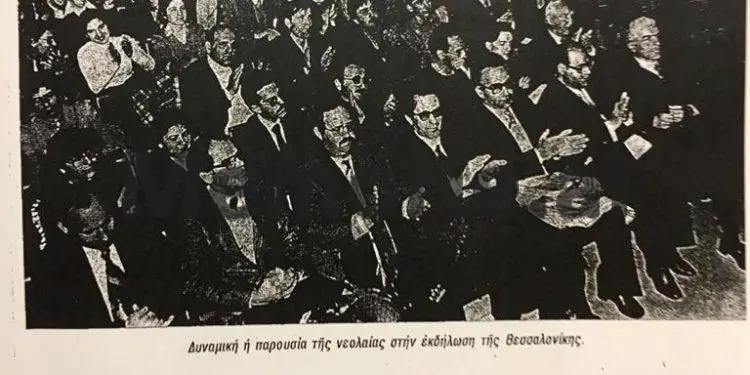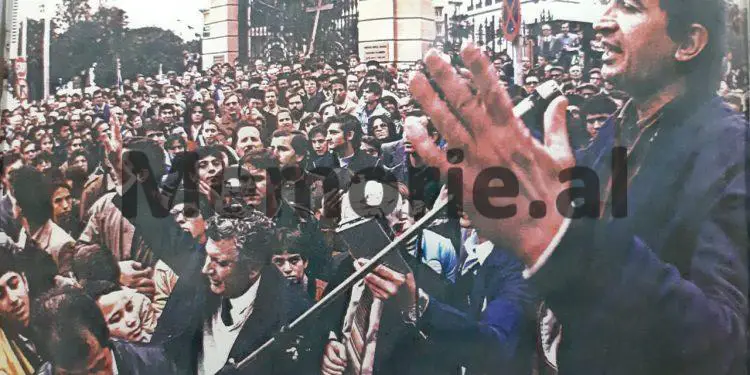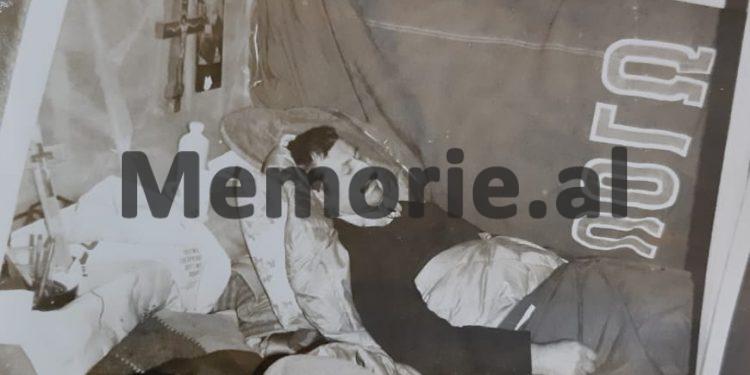Dashnor Kaloçi
Memorie.al publishes some archival documents extracted from the Archive of the Ministry of Foreign Affairs in Tirana and the Information Authority of the Files of the former State Security, which are part of a voluminous file which deals with the rare and unknown history of Ilia Lekë, originally from the village of Glinë in the Greek minority of Gjirokastra, whose family had been living in exile in Myzeqe villages since 1945, and his father, Theodhoriu, had been arrested since 1951 and were serving time in camps and prisons. accused of being a “Greek intelligence agent”.
Attempts by the State Security to recruit Ilian and then arrest him, and Ilias’ escape together with his brother Kriston and their uncle in Greece, where after some threatening letters that Ilia made to Enver Hoxha, Ramiz Alia, and Adil Çarçan, who was asked to get his father out of prison and his wife and son, to allow him to come to Greece, the three of them went on a hunger strike in front of the Albanian embassy in Athens, which lasted until 1984.
The strike sparked major diplomatic tensions between the two countries, as it sensitized not only the Greek parliament and government in Athens but also the Greek press and some ultra-nationalist parties and Vorio-Epiriot chauvinist circles led by Metropolitan Sevastianos, who exploited it. for their interests, as well as Ilia Leka’s speeches in the European Parliament and the American Congress, for the violation of human rights in the communist regime in Albania, until they forced Enver Hoxha to come out and publicly declare: “I say responsibly to the people Greek brother that in the Albanian prisons there are only 46 citizens from the Greek minority and only 4 of them for political crimes ”, as well as Ramiz Alia to release Theodhori Leka from prison in 1989, allowing him to go to Greece forever.
After the publication in four consecutive issues of a series of archival documents issued by the Archive of the Ministry of Foreign Affairs in Tirana, which has long been with the initials “Too Secret” and already declassified, where it is a correspondence of the Albanian Embassy in Athens with the Ministry of Foreign Affairs in Tirana in 1982-’84, regarding the Albanian citizen, Ilia Theodhor Leka, originally from the village of Glina in Gjirokastra and living in the villages of Myzeqe, where they have been interned since 1951, as well as Ilias’ escape to Greece in 1982 (along with his brother and uncle), after they had previously arrested their father, where they went on a hunger strike in front of the Albanian embassy in Athens for nearly three years, raising public awareness. locals, political parties, parliament, the Greek government, various organizations, etc., we conducted an exclusive interview with Ilia L himself ekën, where he sheds light not only on those documents that have already been made public by Memorie.al, but also on his entire history and that of his family, from 1945 to the present.
Continued from the previous issue
Mr. Ilia, what mistake did you make regarding the event at the border ?!
Because when I interviewed them there in Greece, I said the time and place we had been to. And when these people in Albania found out, they went and arrested the border soldiers. This was a big mistake, but it did not occur to us, as we were only telling the truth that otherwise no one would believe us and take us as provocateurs or sent on a mission by the communist regime.
What happened next to you, where did they take you?
After the investigation was over, we were held there in Ioannina, the three of us were housed in a house owned by a local owner, and many journalists came to ask us for interviews, but we were left with a police officer supervising us, and we had to do nothing without them. inform him. When I gave an interview to a journalist and said about an Albanian of Jewish origin that I had known in Vlora, and Abraham as I remember and about the letters, I had sent to Tirana, before the escape, that is, the ones I had written to Enver Hoxha, Ramiz Alisa, etc., the policeman who was guarding us, told me: “You will stay here, because I will be another journalist.” “I stayed here,” I said to myself, and that’s what really happened, as my brother, Kriston, and my uncle, Spiron, were allowed to go to Athens, and I was kept by the owner, with food and drink, and he brought me a lot of journalists who to meet me.
Did that policeman bring you the journalist he said?
Yes, an Israeli came to me and took me to a hall where there were about 100 people, all journalists dressed in suits, foreigners from Europe, etc. I told him, “I will speak Greek.” “I agree,” they told me. That Israeli journalist came to me and asked me about the Abraham I had known when I was in Vlora. “Look,” he told me, “if you tell me openly if you tell us three names of Jews that Enver Hoxha’s communist regime keeps in prisons, we will destroy that regime in 24 hours.” Not only did I not know the names of Jews who were arrested in Albania, but even if I did, I would not say anything to them in the words he said.
What happened to you afterward?
The next day, I see the newspapers, some saying that I was a spy, some others saying that the American CIA taught me to speak like that, etc., etc., which they did not write. I was very surprised. After that, I was allowed to go to Athens where I met my brother Kriston and uncle, Spiro and the three of us decided to stay there and go on a hunger strike in front of the Albanian embassy, but only my uncle, Spiro stayed with me for ten days and then I continued alone, as he too fled. So everything, protests, rallies, speeches, and the whole hunger strike was done only by me.
Where did they go, then Kristo and Spiro?
Spiro stayed in Athens where he settled down for work, while his brother, Kristo, went to a Greek village on the border with our village of Glina, where he was engaged in livestock farming with some 50 sheep. He lived and worked there all the time and after marrying an Albanian girl until he passed away in 2016. Our fates were shared and we rarely met, as I followed the path for which I had escaped and gone to Greece, so to protest with all my possibilities, regarding what the Albanian state had done and was doing to our family, keeping my father in prison in vain, with absurd accusations made by those of the State Security. And all that I have done is clearly and accurately described in the documents of the Albanian embassy in Athens addressed to the Ministry of Foreign Affairs in Tirana, which you have published by making them public in your writings. So: from the threatening letters I made to Enver Hoxha, Ramiz Alia, Hekuran Isa, etc., meetings with politicians and MPs, protest rallies in front of the embassy, speeches I gave, etc., etc., which I believe is not necessary t ‘we repeat. There are other letters that I have made to Enver Hoxha and Ramiz Alia since I was in Albania, so without running away and see that there in the archives should be with these that you found since when I was there I asked for my father’s right mine that was completely innocent.
Before we went there, that is, to your hunger strike and your protests, were you not offered a job when you went to Athens?
I was immediately offered a job as a mechanic in a factory, but I did not stay there for more than ten days even though it was a very good job. Because I was isolated all the time and did not have the time and opportunity to strike and protest in order to achieve the goal I had set for myself, that is, to stabilize public opinion and politics there, so that they could put pressure on the communist government. of Tirana, regarding the inhuman treatment that was being done to my family in Albania, where the old father and one eye were kept in prison in vain, and my mother, my wife, and the little boy were interned. All this, I had made known to Enver Hoxha, Ramiz Alia, Hekuran Isa, through some letters where I threatened them. So I had clear things and I had made them known, both to the leadership of the Albanian state and to the Greek ones and the public opinion. Look at my letters that you yourself have published and other documents of the Albanian state, there you have clearly reflected everything of my activity. So, I repeat to them once again that: I did not escape to Greece just to save my head and fix life like Ilia, because if it were so, first: I would stay in Albania closing my mouth and I would be subject to a fate like everyone else, working where I did not earn a little, as I was a master as a mechanic. And second, when I came to Greece, I had the opportunity to settle down and live miraculously, even starting a family from scratch, but I didn’t do any of these, because I came here, not for myself, but for my family that I had left in Albania.
Let’s go back to the hunger strike and your protests, as well as the rallies you held and the speeches you gave, where according to the documents we published, in addition to political parties and various organizations, they were also used by Greek chauvinist circles, such as and segments of the Greek Orthodox Clergy, such as Metropolitan Sebastiano’s, etc., for the so-called “North Epirus problem” ?!
They also used them for their own purposes, but I could not stop them, as I did not have any opportunity. So, in a way, I was like the work of that bear dancing to the music of the bear, who with the tambourine, collects the money that is thrown there. I believe you understand very well what I mean by that. So, from the “dance” that I threw with the strike that I was holding, the protests and speeches where I was looking for and talking about my legitimate rights, a part of the “profits”, were taken by others, that is, those chauvinist circles that used it for purposes. their that situation. What could I do to them if I could stop them? But you don’t know that in addition to these, the support I had from politics and these organizations, I had many other obstacles.
Specifically, what?
In all those protests and the hunger strike that I did, I did not have any support from the Greek government, on the contrary, because PASOK had good relations with Enver Hoxha’s Albania and did not want to create problems, so it hindered me. There were some PASOK leaders who supported me, but officially as a government, they prevented me from being forcibly removed from the tent where I was going on hunger strike in front of the Albanian embassy. So, if it weren’t for the opposition, the New Democracy, and its supporters, they wouldn’t have let me protest, it was the MPs and their supporters who supported me in everything I did to raise awareness among the Greek public. where the Greek press also gave me great help. They may have done it for their own interests, but they have supported me immensely.
Let’s go back to your private life in Greece after you left that job as a mechanic, where and how you lived and how you coped with living all the time you went on hunger strike and the protests that are reflected in the documents we published. we and all the video materials, brochures, newspapers, magazines, etc., that you have?
After I quit my job as a mechanic for the reasons I was told, I worked as a gardener in various private homes, and with what I was paid, I could afford to live without any problems… In that job and in those houses, eating bread with cheese and sausage, I lived until the late ’80s, living a very simple life, until I achieved my goal and they allowed me to the rest of the family that was in Albania came.
Before we go there, then, to reunite with the family, can you tell us, during those years when you went on a hunger strike and various protests, did you have problems with the Albanian embassy in Athens and with the Albanian state?
I had so many problems that if I started telling you everything, it would take hours and days to write them down, I don’t know where to start!
Briefly some of the most important?
When I first came here to Greece in April 1982, Albania’s ambassador to Athens was Bashkim Dino, but after a few months, this was removed and replaced by Xenophon Nushi, or Chenon, as they called him, a man who said that he is a personal friend of Enver Hoxha. After his arrival, many things changed, starting with security problems. The first was that of the staff of the Albanian embassy (who lived in a five-story building, with a part of their families), where the food supply was no longer done as usual in Athens, but for fear of being poisoned. , they were brought by plane from Tirana once to jaëv, every Tuesday.
In addition to security issues, did you have any encounters with embassy staff and how did they treat you?
The first thing that happened to me, where I am 100% convinced that the embassy had a finger, was an attempt to physically kidnap me. So just a short time after I started the hunger strike, while I was staying with a friend of mine, Gëzim Muka (originally from Tepelena), four half-masked people got out of a private car and grabbed me and dragged me to it. forcibly inserted into their car. I resisted and shouted so much, asking Gëzim for help, who quickly approached and badly hit them, forcing them to release me and run away quickly with their car that was on and with one person. at the wheel. I escaped from them only in that of Joy, for they would have taken me by force, and of course, they would have thrown me dead in a place where no one had ever found me.
Who were those people and did this become a problem, so did the police come?
I never learned who they were, because as I said, they were half masked, with a civil license plate that they said was fake, but it didn’t take much to understand that after that action, the Albanian embassy, or the people who came from Tirana, ie the State Security. The police came immediately and pursued them and took me to the police station for questioning, where I gave my explanations together with Gëzim. There was a lot of fuss, as the next day the main newspapers wrote in big letters and the name of Ilia Lekë became the main news. I have saved most of those newspapers and I can give them to you whenever you want to view and publish them.
Specifically, what was told to the police?
They were interrogating me about the incident and finally told me that I also had to be careful, that anything could happen, so I kept my head. So after this event, I was forced to change homes often without anyone telling me where I was staying and where I was sleeping so I could be sure that anything could happen to me. But fortunately, I no longer had such problems, but clashes and confrontations with those of the embassy, or others coming from Albania, I had constantly, as I did not leave them comfortable.
Before we get there, to your confrontations and problems with the embassy staff, can you tell us who your friend, Gezim, was, and under what circumstances he was in Greece?
Gëzim Muka, or Kosta as I called him, was originally from Tepelena, from his father, and from his mother, Zervati, a village of the Greek minority in the Gjirokastra area. Gëzim’s father, Rahmi Muka (orphaned and raised in the Saranda Orphanage) was married in Zervat where he had served in the military and escaped from Albania to Greece in 1964, fleeing the border post. served as a non-commissioned officer and had previously been a soldier there. His son, Gëzimi, fled Albania in 1983 and came to Greece.
How could Gëzim escape?
Gëzimi escaped from the village of Freshtan in Gjirokastra on January 7, 1983, where he had gone to fix the mule’s saddle with which he worked as an animal. That day, border guards killed a 19-year-old man from Freshtan, Spiro Kokoli, in an attempt to escape from Albania to Greece, who was killed and his body was found dead after a “ZETOR ”and walked it in some border villages such as Freshtan, Peshkëpi, Glinë, Derviçan, etc., in order to terrorize the inhabitants of those areas, so that no one would dare to escape as there would be His “fate”. Gëzim had seen with his own eyes the whole event and was horrified and even told me the name of the Zetorist, Theodhor Lapi, who had been forced to board his “ZETOR” while walking through that deserted village. in the village. As a very smart boy, Gëzimi thought that on that very day, when all the attention of the forces and border units was focused on the event where the residents of those villages were forced to gather to watch that scene, he decided to he fled and headed for the border, crossing without any problems and leaving for Greece. I had a lot of fun with him, because he was a boy of faith, very strong, and if it weren’t for him, they would have kidnapped me and I would surely have died.
What about other fugitive Albanians?
I also had other fugitive Albanians, such as Niko Pleqi from Tirana, a former frontier soldier who escaped in 1983 by going to Greece with all the ammunition he had there in the pyramid where he performed military service. I went to Nikon and took him to the Llavros Camp, where the fugitives were initially held, and after keeping him in my house for a few days and finding him a job, he gained political asylum and fled to the United States, where he still lives today. I also helped those two athletes of the “Vllaznia” team, Hoxha and Bërshem, who came here for a football match, as well as the translator, Ilir Bulka, with whom ….
Memorie.al
Follows tomorrow




